Settling the Debate: In-house vs Outsourcing Software Development - A Statistical Overview For 2024
The debate over in-house vs outsourcing software development is a hot topic amongst businesses, with both sides touting the advantages of their preferred approach. With so much conflicting information out there, it can be difficult to decide which option is best for your business.
To help you make an informed decision, we've compiled a comprehensive statistical overview of the current state of in-house and outsourced software development for 2024. We'll explore key metrics such as cost-effectiveness, time-to-market, quality assurance, and security measures to give you an accurate picture of each approach before choosing.
Aloa is a dedicated software development outsourcing company linking individual and professional teams to clients globally. So, you're in the right place to get all the details in weighing out your options.
So if you're unsure whether in-house or outsourced software development would benefit your business this year, keep reading and get ready to weigh the pros and cons!
Let's dive in!
Overview of In-house and Outsourced Software Development
Startups and businesses weighing their options between building an in-house team or hiring an outsourced professional for their software development benefit from knowing what the market trends and industry standards look like in 2024.
Over the past few years and in the years to come, the software development industry has seen steady growth in the number of businesses exploring software development as their primary means of achieving their desired business goals. Proportional to that, the tech industry has also seen a surge in need for qualified and experienced software developers.

Whether a startup or small business opts to build an in-house tech team or outsource their software development work to a third-party provider depends on various factors, such as available resources, budget, and risk appetite. There are several factors up for consideration before making your final decision. Only by assessing each factor and weighing the pros and cons of each option can you be sure that you have made the right choice for your business.
Let's explore the key factors and their statistics for in-house vs outsourced software development in 2024 to help you decide which is best for you.
Factors To Consider Before Deciding On in-house vs Outsourced Software Development
To ensure you're making the best decision for your business, it's important to consider a few key factors before choosing between in-house and outsourced software development. Below are the three most important factors to consider:
Cost-effectiveness
Depending on the size and complexity of your project, in-house software development can be more costly than outsourcing. Outsourcing providers often offer lower costs due to fewer overhead costs, meaning you could get a quality product at a fraction of the price.
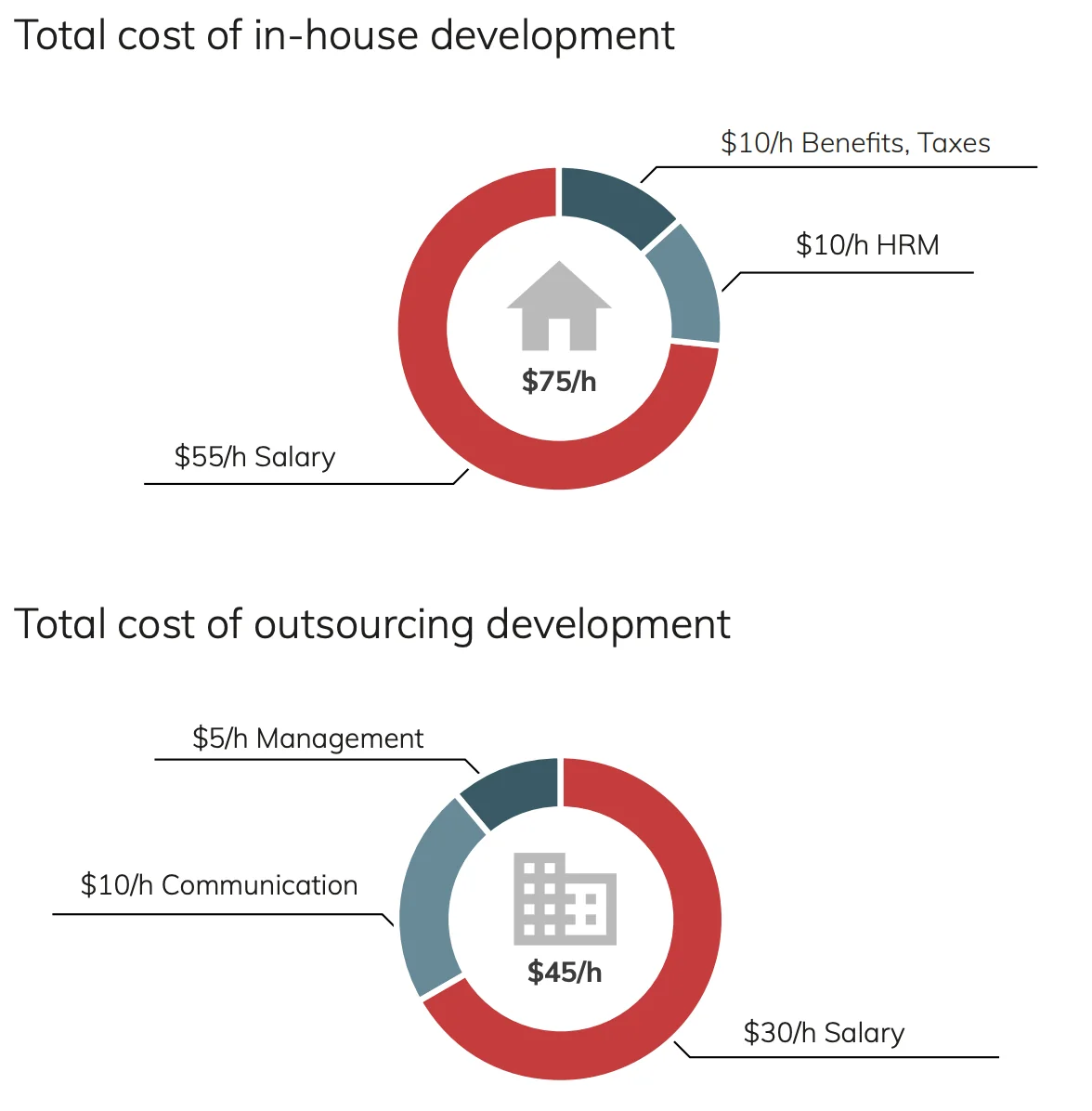
Additionally, startups and businesses can choose from a large pool of potential candidates, regardless of geographical location. Those looking to reduce costs can opt for more affordable markets like Latin America or Asia in souring their professionals.

Time-to-market
Both in-house and outsourced software development comes with a certain timeline for completion. in-house teams typically take longer to develop products as there is often more bureaucracy, whereas outsourcing can reduce the time-to-market significantly due to external providers using existing infrastructure.
However, there are instances where investing in an in-house team of developers can decrease the time-to-market timeline provided the startup or business remains flexible and adaptable to meet current trends and market needs. When considering time-to-market, keep in mind the three approaches:
- Traditional development
- Accelerated development
- Additional innovation
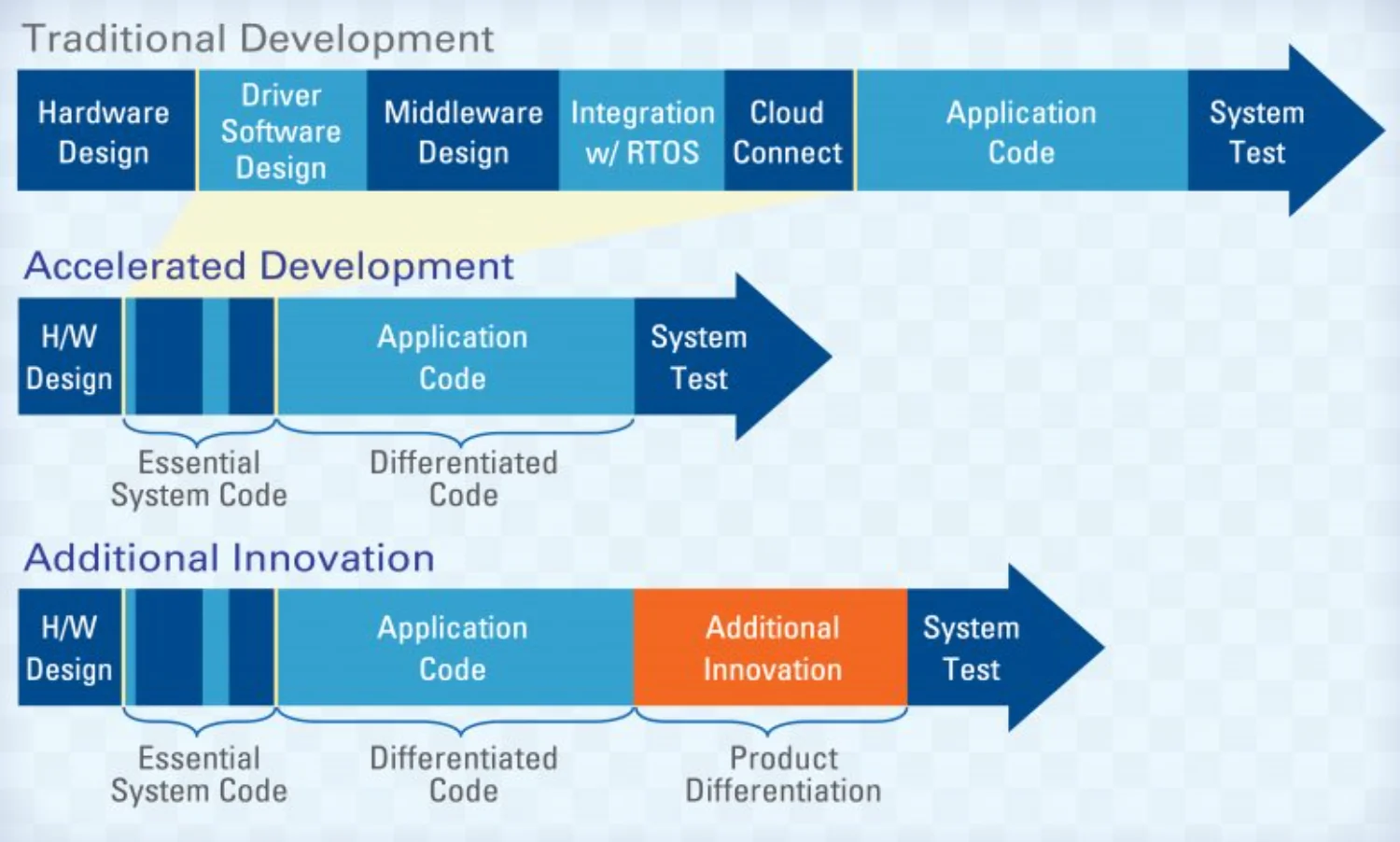
Each approach may work differently depending on the size and complexity of your product, but whether in-house or outsourced, a well-established process is important in meeting designated timelines and launch dates.
Quality Assurance
Quality assurance is important regardless of whether you choose in-house or outsourced software development. High-quality assurance standards ensure your product performs as expected while meeting customer needs and expectations.
In software development, it's essential to lay out proper performance metrics in evaluating the usability and performance of the final product. Having a baseline or a set metric for performance and customer satisfaction is essential for any software development project.
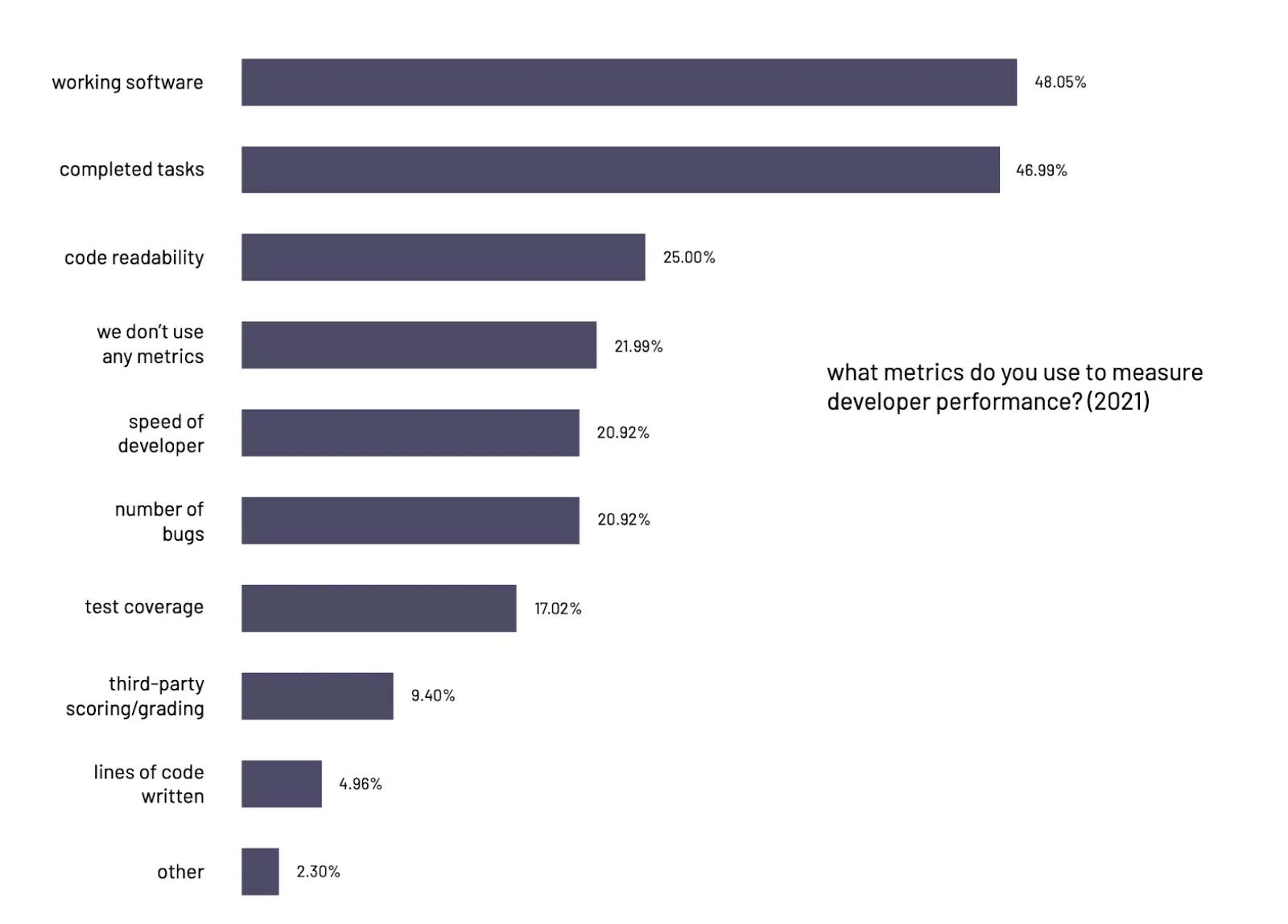
This will ensure that you can adjust or tweak the product as needed to provide the best user experience for your customers. With outsourcing, you have the added advantage of having access to a broader pool of talent, meaning that there is likely an expert on hand who knows how to develop highly reliable solutions.
On the other hand, in-house teams allow for more control over the process and greater visibility into how the product is being developed. This can help to ensure a higher level of quality assurance and better customer satisfaction. Deciding between in-house and outsourcing software development comes down to what is best for your business.
Regardless of which option you choose, vet any potential contractors or developers thoroughly before signing a contract. This way, you can ensure the quality and security of the software while minimizing risks and ensuring a successful development process.
Finally, remember that both in-house and outsourced software development comes with unique advantages and disadvantages, so assess your needs carefully before deciding. So, let's move on to breaking down the specifics in terms of pros, cons, and best use cases for in-house and outsourced software development.
What is In-house Software Development?
In-house software development refers to the practice of developing software products within an organization's premises, usually with its resources. This is the traditional approach to software development, and it can be a great option for those who want greater control over their product and the process.
in-house software development teams often benefit from access to an immediate pool of talent and resources and increased visibility into the product's development process. Startups and businesses that invest in an in-house development team can often develop products quickly and keep costs low.
Common Challenges With In-house Software Development
Building an in-house team of developers can be time-consuming, as it requires significant resources and investments. Additionally, having an in-house team also requires that the business has access to the necessary technology and tools needed for software development.
in-house teams are also more likely to become bogged down with bureaucracy, leading to slower turn-around times on development projects. Below you can see the common challenges associated with an in-house software development team in percentages:
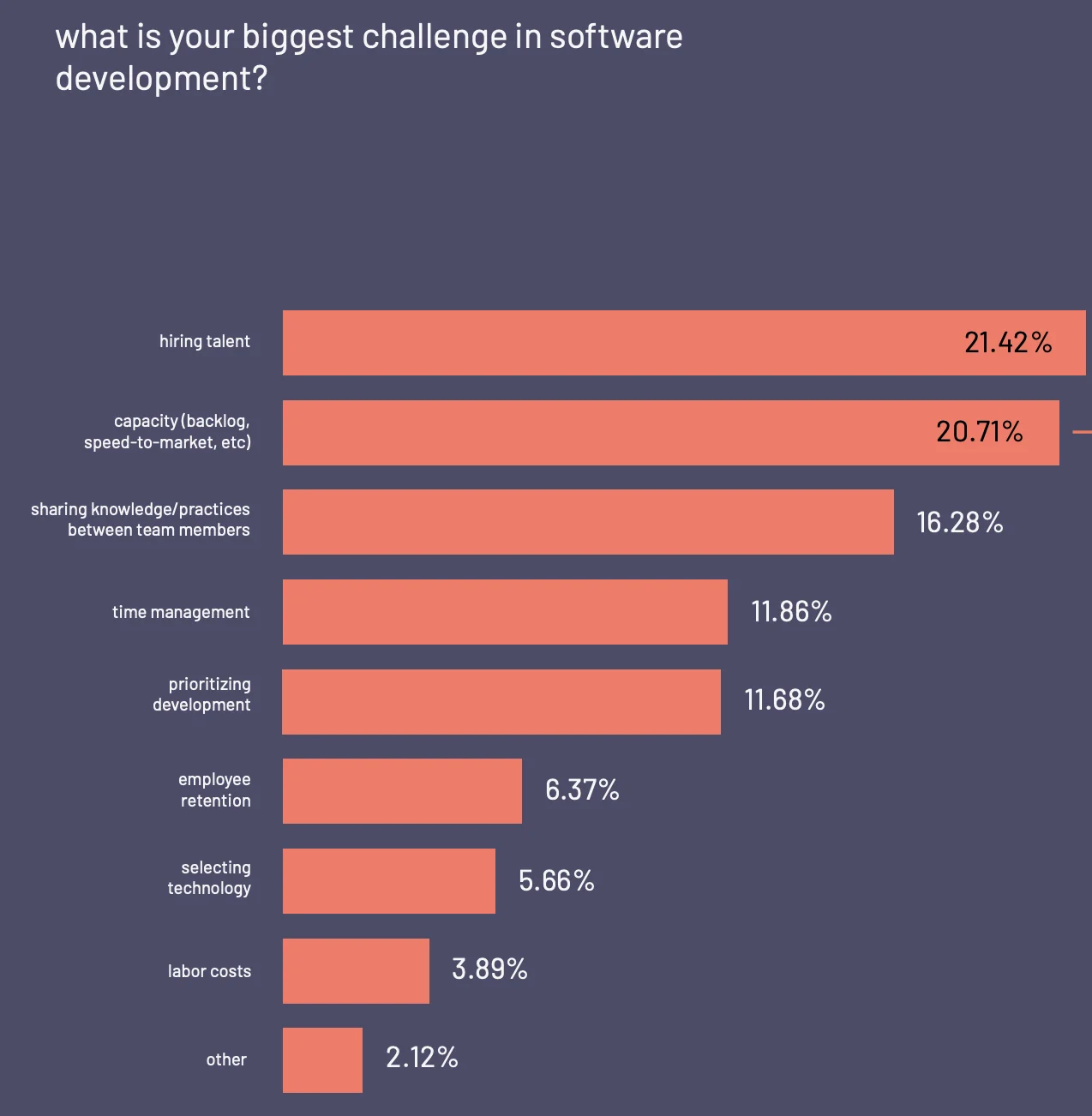
These challenges are often compounded by the fact that in-house teams are generally not as agile or scalable as outsourced development teams. This can be a problem for startups and businesses that require quick turn-around times on their projects.
Advantages of In-house Software Development
Despite the challenges of in-house software development, there are many advantages. In-house teams are more likely to be invested in the product and have a better understanding of the company's vision, which can lead to higher-quality solutions.
In-house teams can also make faster decisions and adjustments, as there is no need to wait for feedback from outside sources. This can help to ensure that the product meets the user's needs.
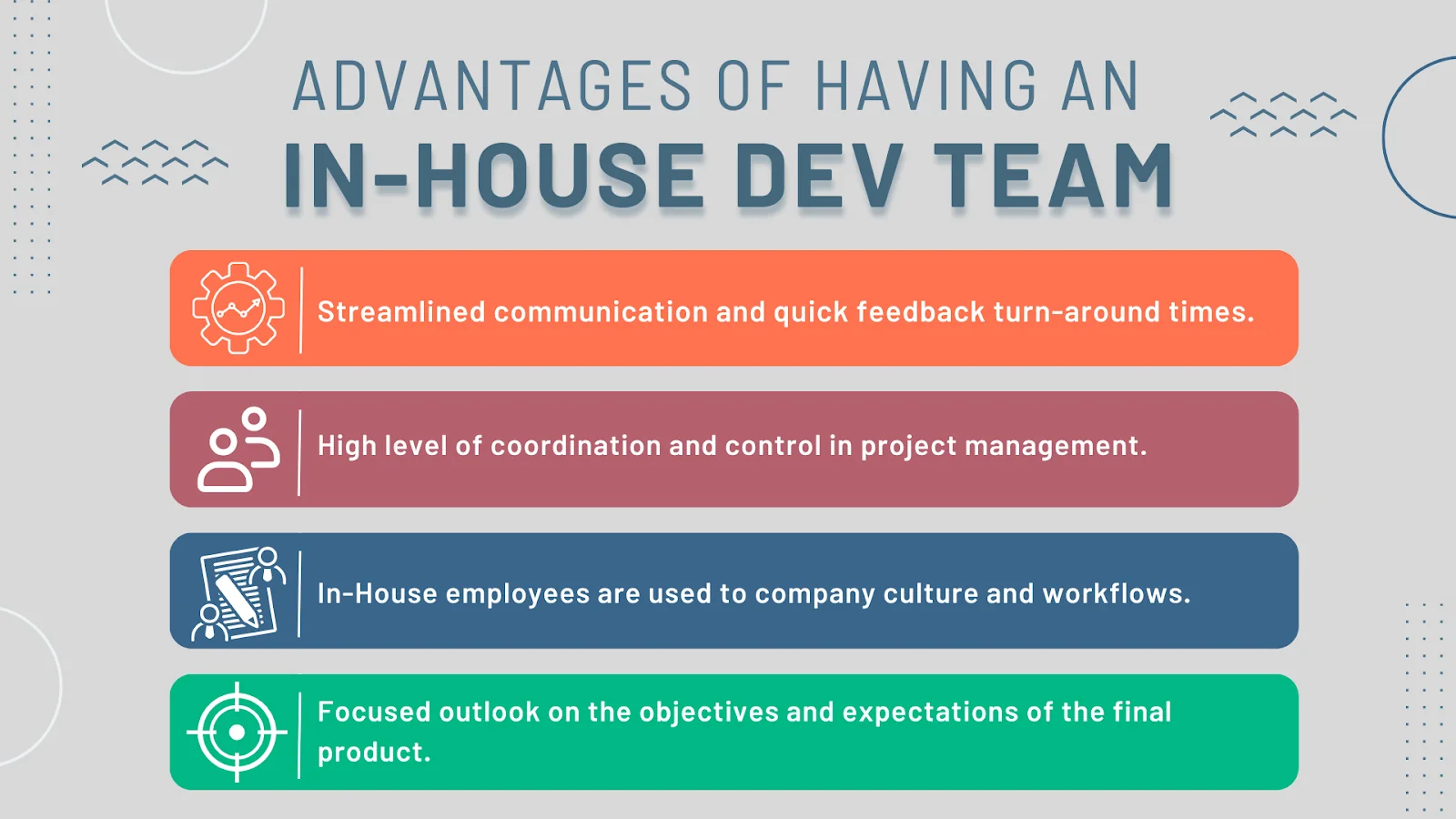
Disadvantages of In-house Software Development
On the other hand, there are a few downsides to this approach. It can be difficult to find and hire developers who are specialized in a particular technology. Additionally, in-house teams can be expensive to maintain and are often limited in terms of scalability and agility.
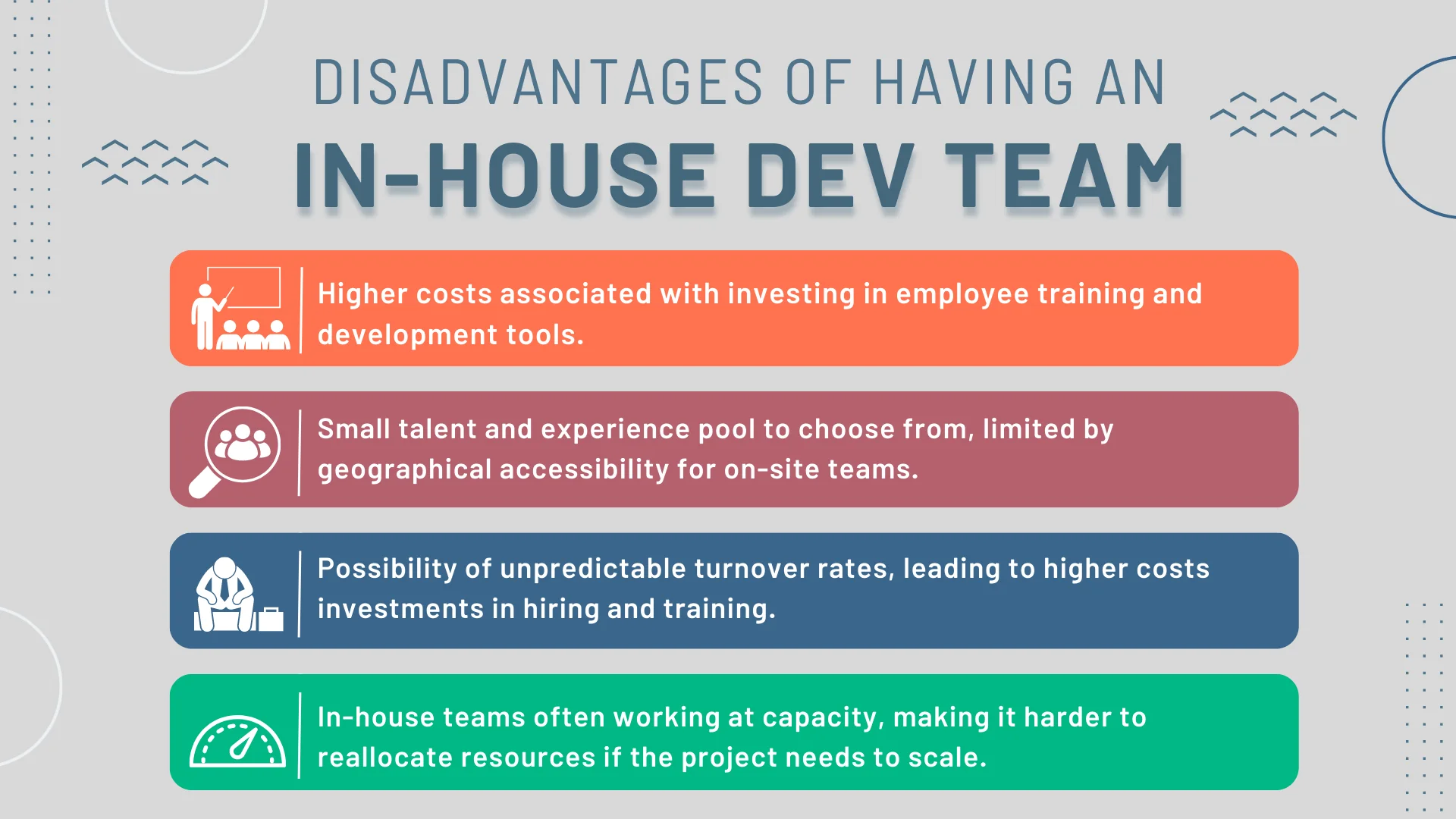
When to Opt For In-house Development
The associated challenges, advantages, and disadvantages of opting for an in-house team are something that businesses should consider before making a decision. In-house software development can be the right choice for those who are:
- Ready to invest in long-term development
- Looking for greater control over the process
- Want to utilize existing resources
- Need to develop highly complex products
- Need to develop highly secure solutions
- Want enhanced security and quality control
How To Find Professionals For Your In-house Software Development Team
Opting to build an in-house team of software developers leaves you with a handful of options when it comes to hiring. Nowadays, companies can use platforms like LinkedIn, HubStaff Talent, Glassdoor, Indeed, and SnagJob to gain access to profiles and resumes. However, keep in mind that the fast growth of the industry has left a skills gap, leading to a shortage of professionals:
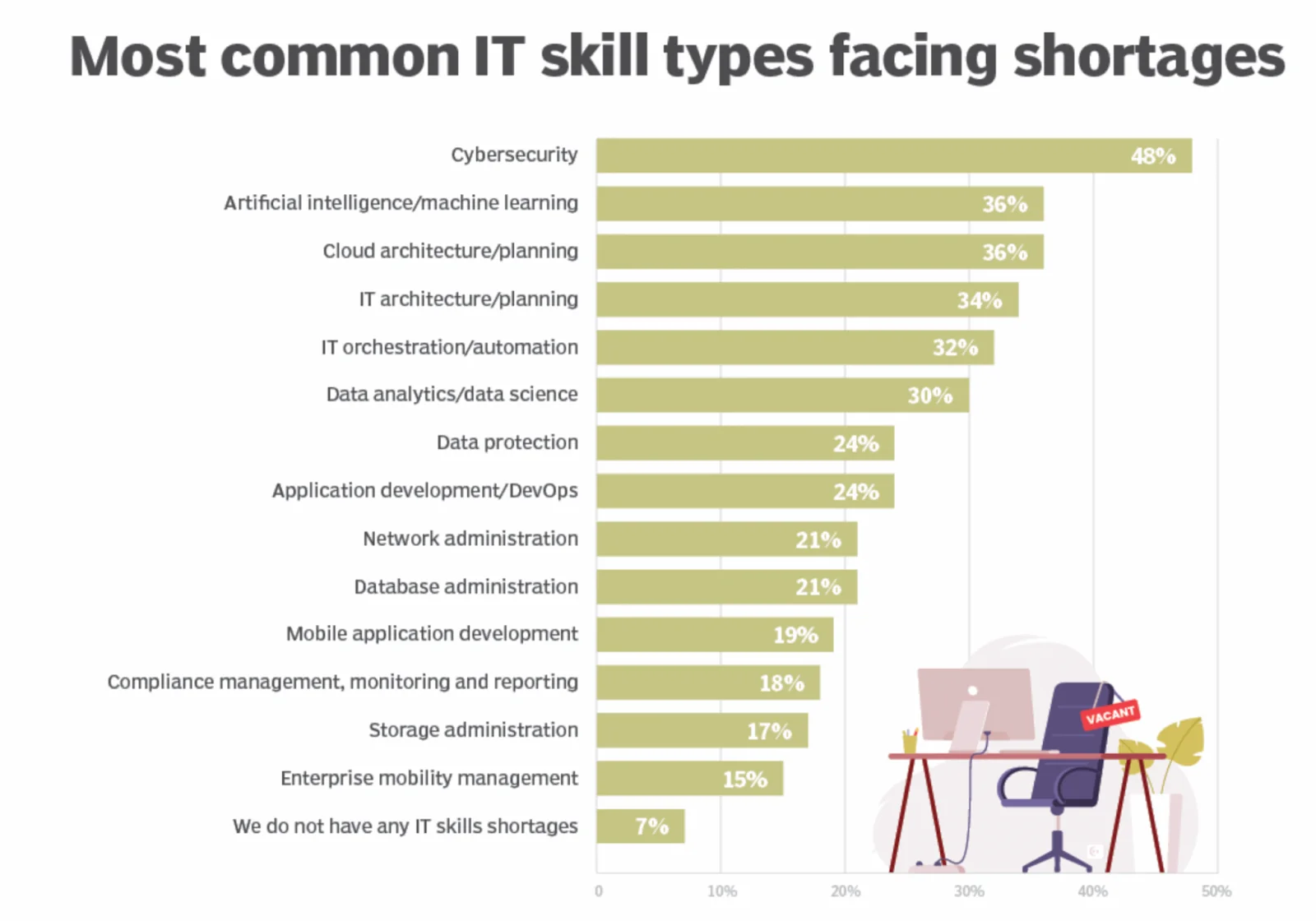
Currently, the expected projections for the industry and, in turn, available professionals stand at:
- A worldwide shortage of full-time software developers was 1.4 million in 2021 and is expected to grow to 4.0 million by 2025.(IDC)
- Until 2031, the software development industry is expected to grow 25% faster than the current average.(Bureau of Labor Statistics)
- Since November 2021, 73% of software developers plan on changing their positions/work methods within the next 3 years. (Boston Consulting Group)
- 61% of human resource professionals say they have difficulty finding qualified developers and talents to fill vacant positions. (Bairsdev)
What is Outsourced Software Development?
Outsourced software development refers to the practice of hiring external individuals or teams to develop a software product. This approach has become increasingly popular in recent years, as businesses can now find the resources they need at a fraction of the cost and time.
Additionally, outsourced software development operating with an external team allows businesses to benefit from the skills and expertise of professionals who are specialized in a particular technology, regardless of their geographical location. Having that benefit eliminates the need for businesses to hire and train their developers, which can be costly and time-consuming.
Outsourced software development also offers greater scalability than an in-house team, as developing a product with an external team allows businesses to access the necessary talent and resources faster while ensuring that the project is completed on time.
Nonetheless, opting for outsourced development is not without its downside. Just like in-house, startups, and businesses need to consider their needs and requirements.
Common Challenges With Outsourced Software Development
Outsourcing software development comes with its own set of challenges, such as:
- Language barriers
- Cultural differences
- Time zone differences
Additionally, getting feedback on the progress of development projects can be difficult, as communication between in-house teams and external developers may not always be as smooth or efficient.
Despite these common challenges, outsourcing software solutions are still viable for businesses looking to build quality products quickly and efficiently. In terms of why companies opt for outsourced over in-house development, these are the most common:
Advantages of Outsourcing Software Development
Considering the unprecedented growth, the software development industry is expected to see in the coming years, more and more companies are looking to outsource their needs to meet market demand for skilled professionals. While there are challenges in opting for outsourced software development services, the advantages are also worth mentioning:
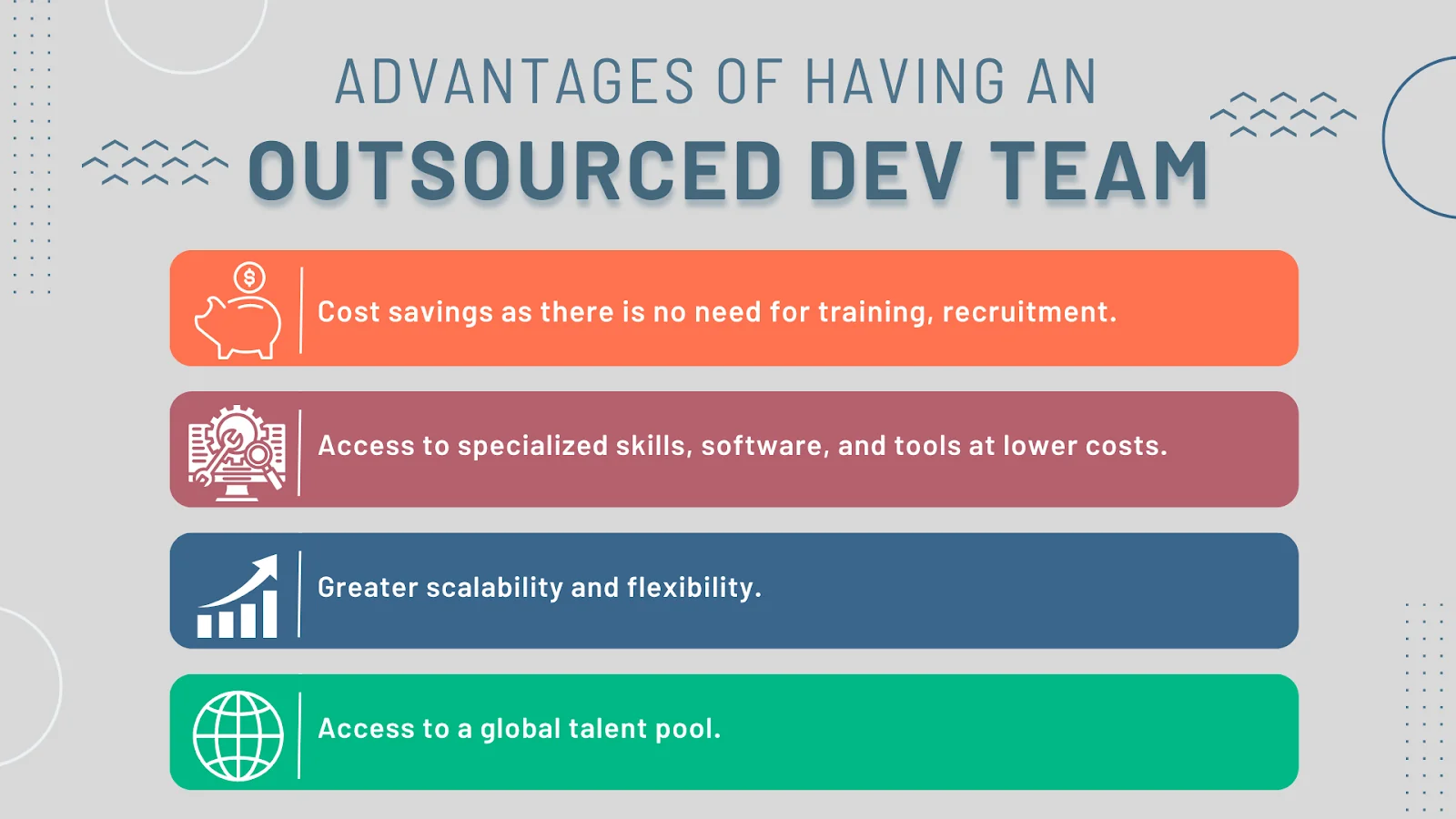
Disadvantages of Outsourced Software Development
The disadvantages of software development outsourcing stem from language, time zone, and cultural barriers. Aside from that, a few other considerations could potentially affect the deliverability and efficiency of your software development goals.
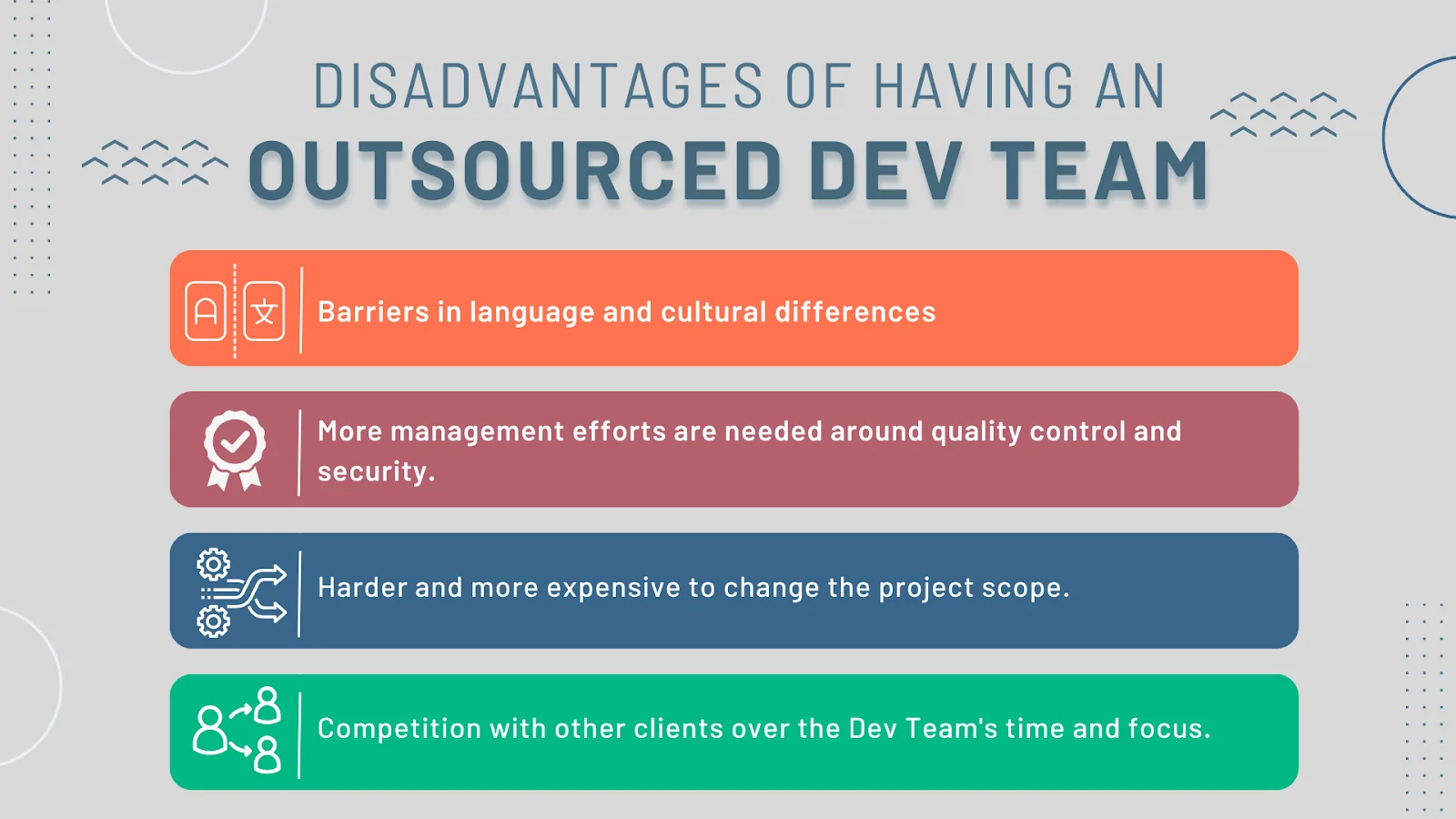
When To Opt For Outsourced Development
Startups and companies who plan on hiring an outsourced team of software developers for their next project often look for the following benefits associated with outsourcing:
• Looking for a quick turn-around time
• Need To Develop Highly Complex Products
• Want To Utilize Existing Resources Over Investing In Long-Term Development
• Need To Access Specialized Skills At Lower Costs
Before settling for a team, however, keeping in mind the following details will ensure you choose the best partners based on the project you have in mind.
Which project management methodology do they use and does it align with yours?
Outsourced software development teams and professionals will likely have a set process. Understanding these processes and management styles lets you know if they are a good fit for what you have in mind, whether app development or web application development.
Usually, teams or individuals will apply one of the following methodologies in software creation:

Are the outsourced professionals using the ideal tools and software to create your product?
Just like methodologies, each team and individual will have a preference for the software used. Before finalizing the deal, make sure to evaluate which software they use. Having talented developers won't get you the desired results if they are not using the ideal software for your project, especially if it is a custom software development project with very specific parameters.
These are the top software tools used by developers:
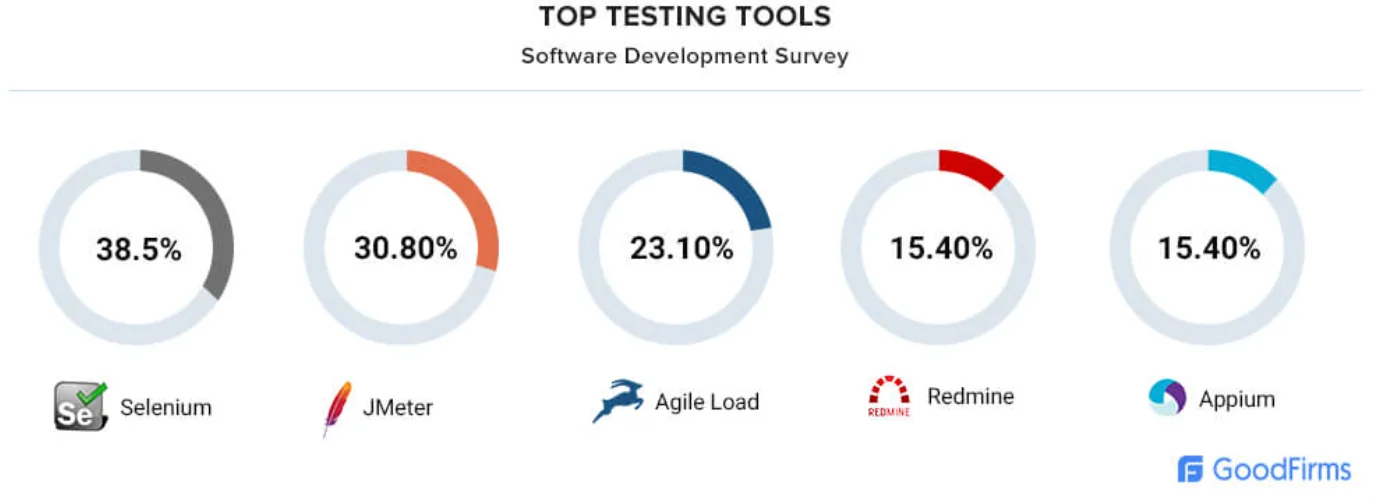
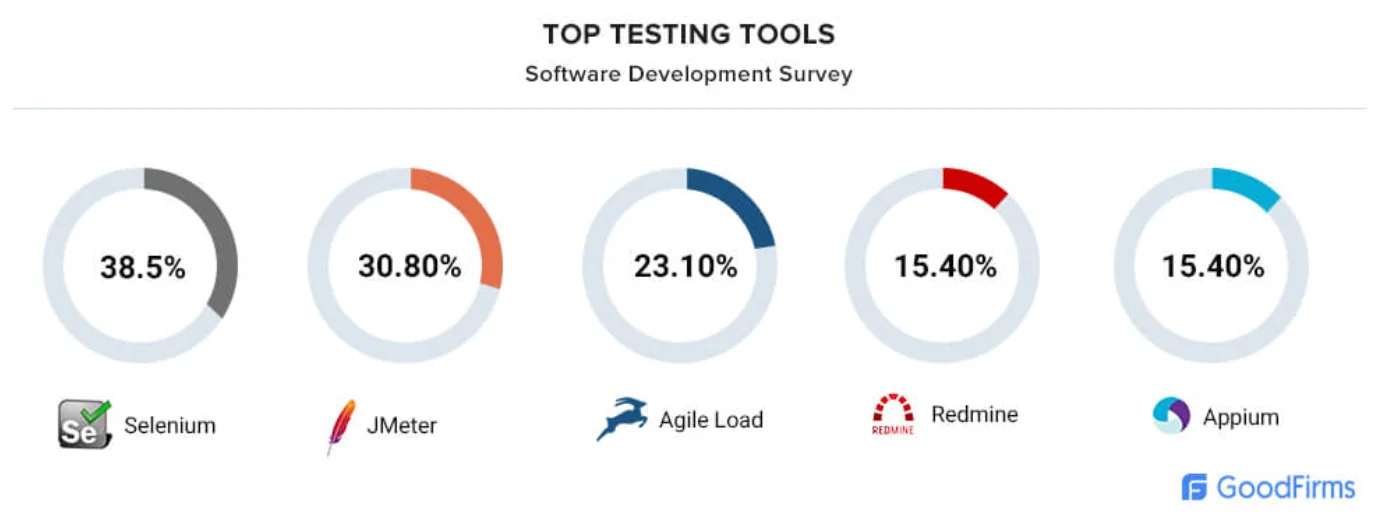
How To Find Professionals For Your Outsourced Software Development Team
The software development industry is highly competitive, and there are a variety of platforms that can help businesses to find the right professionals for their projects. Today, there are a number of professional websites that act as a third-party provider, linking professionals to potential clients. Here are a few options:
- Freelancers
- Remote Teams
- Software development agencies
- Social media
- Professional networks
- Referrals and recommendations
One way to ensure your outsourced team has a reputable background is to work with an outsourcing partner like Aloa. An outsourcing partner will manage recruitment by finding the right professionals for your outsourcing recruitment needs and building the team members to work on your software development project.
The upside to working with a software outsourcing service provider is that you'll get a dedicated project manager to handle every aspect, including day-to-day team management. As a result, typical roadblocks such as different time zones and concerns about quality assurance are mitigated as the service provider thoroughly handles them. To learn more about your options, read up on Aloa Manage and the solutions it solves!
Who Wins The Debate?
Returning to our initial considerations, it's clear that both approaches have advantages and disadvantages. Budget, deadlines, project scope, and team size are all important factors to consider when deciding whether to go for in-house or outsourced software development. Let's revisit each consideration and who wins based on the highest potential of achieving project success:
Cost-effectiveness

Outsourced services take the win for being the most cost-effective solution to software development needs. The ability to choose the geographic location of developers means there is also great flexibility in choosing your desired price point.
Taking into account the cons of in-house development in terms of cost boils down to the following:
- Resources spent in the hiring process, including employee onboarding and training to ensure new employees are up to speed on the company's culture, can become time-consuming.
- Finding the right professionals with extensive experience within the area is often difficult because of the skill shortage.
- The financial investment of adding employees to the payroll and potentially investing in dedicated office space for a new team can add up in overhead costs.
Time-to-market

Depending on the specific skills you're after, choosing between in-house vs outsourcing software development boils down to ensuring you have the right partner that meets the fast-paced market and growing trends you need to meet. Also, your time to market hinges on any budget constraints that you may have.
In-house development is ideal for long-term projects where the team should be well acquainted with the company culture, processes, and long-term goals. Outsourced development is a good choice when you need to quickly scale a team or have access to skill sets that are not available in-house.
Quality Assurance

In general, a software project's quality heavily depends on the team's skill level and ability to work together as efficiently as possible. For this result, in-house development takes the win because it generally allows for better collaboration within the team, more transparency, and easier control of the development process. However, you can mitigate this risk by working with companies like Aloa, who vet outsourced talent for you and make sure that the developers are a good fit for your company and project.
Overall, it's important to remember that both approaches have advantages and disadvantages. It ultimately depends on a business's project goals, resources, and capabilities. Companies must be aware of all available options and understand their needs to make an informed decision.
Your Third Option: Hybrid Software Development Approach
A hybrid software development approach combining the benefits of in-house and outsourced software development can be a viable solution. This approach allows businesses to have greater control over the process while leveraging the benefits of outsourcing.
By using a hybrid approach, businesses can maximize the advantages of both options while minimizing their disadvantages. Using the hybrid approach, the best solution is to hire a well-rounded in-house software engineer or manager and build an outsourced team based on product requirements.
With that, you'll have the advantage of having a well-rounded and experienced in-house lead who can strategize and manage and access a larger pool of talent for a project that may require more specialized skills.
Key Takeaway
Startups benefit from building an in-house team should they expect large-scale growth in terms of expanding their offerings. On the other hand, outsourced services work best for new products with a short time-to-market, where access to an extensive talent pool is needed.
Always consider the factors for consideration when weighing your choices to better gauge which option is the most suitable for your project. Only then can you make an informed decision and settle the debate between in-house vs outsourcing software development.

